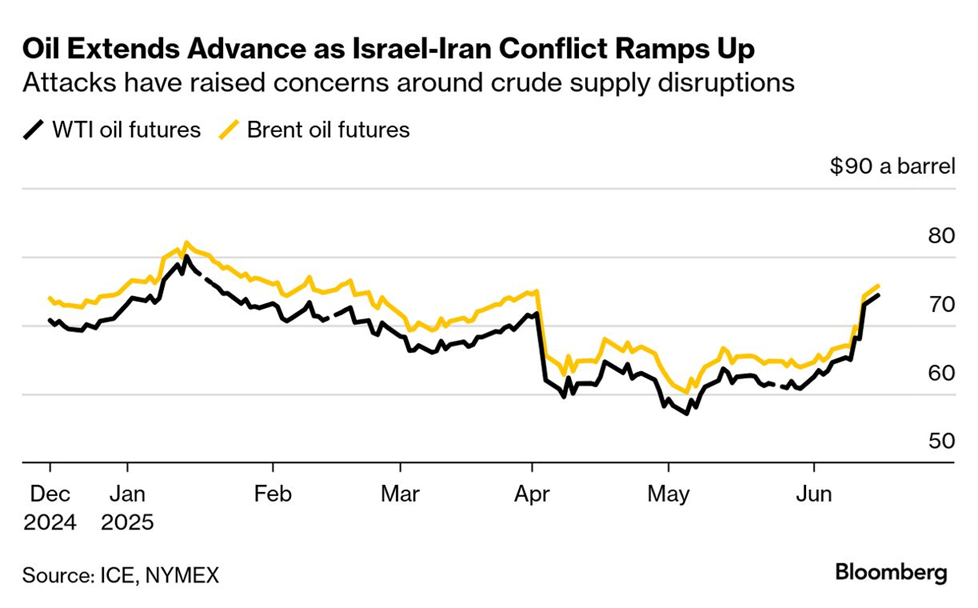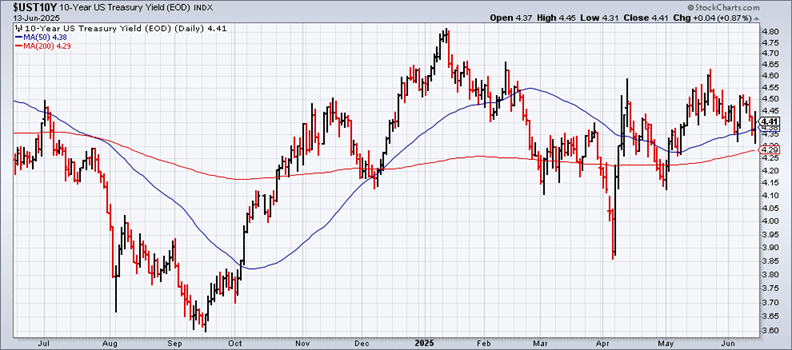Sun Valley Gold sells Vista Gold (VGZ) shares worth $2.16 million
The Israel-Iran conflict continued for a fourth day as each country launched attacks on Monday. The fighting threatens to elevate oil prices for an extended period and bring a new phase of instability to the global economy that’s still reeling from elevated tariff risk.
The main macro threat from fighting between Israel and Iran is a run-up in energy prices that persists and drives headline inflation higher.
“So far Iran has directed its focus at Israel,” said Richard Bronze, head of geopolitical analysis at research firm Energy Aspects. “But the market will be concerned about the energy infrastructure across the Middle East, and about the Strait of Hormuz itself,” a reference to the narrow waterway through which roughly a third of the world’s seaborne oil and gas is exported. For the moment, oil exports continue to move normally through the strait.
The situation remains precarious, however. A member of the Iranian parliament’s security commission said closing the Strait of Hormuz is under consideration.
Oil prices have increased since Israel launched attacks on Iran on Friday, but prices so far remain in a range that’s prevailed year to date.
Luis Costa, global head of EM sovereign credit at Citigroup Global Markets, said the limited market reaction may be due hopes that the conflict will be contained. “So markets are obviously, you know, bearing in mind all potential scenarios. There are obviously potentially very bad scenarios in this story,” he reasoned in an interview today. “But there is still a way out in terms of, you know, a faster resolution and bringing Iran to the table, or a short continuation here, of a very surgical and intense strike by the Israeli army.”
Analysts at DBS, a bank in Singapore, noted: “Middle Eastern wars in the 1980s and 90s did not lead to prolonged oil shocks.” Nonetheless, the Israel-Iran conflict is a “gravely worrisome development. Over a spectrum of adverse to extremely adverse outcomes, the market is so far inclined to coalesce around the less dire possibilities.”
The risk of a sustained rise in energy prices is that the shift drives up headline inflation at a time when upward price pressure from tariffs is still resonating. Although US consumer inflation remained relatively modest in May, many economists advise that inflation shocks can take several months to show up in the data and so it’s still too early to assess the effects since the US announced tariffs in April.
“The conflict has the potential to generate some additional angst about the health of the consumer, the broader economy, and the path of the Fed, a narrative shift that seems likely to be problematic for stock prices,” strategists at RBC Capital Markets wrote in the note.
The Federal Reserve is expected to leave its target rate unchanged in tomorrow’s policy announcement. Markets will be keenly focused on comments by Fed Chairman Powell and new economic forecasts scheduled for release by the central bank. A key question is how or if the Israel-Iran conflict has changed expectations and risk analysis at the Fed.
A related focus is how the benchmark US 10-year Treasury yield reacts to this week’s macro news flow. In last week’s trading, this key rate eased to 4.41% on Friday, a middling range for the year so far.
“The market is quite volatile, with investors gravitating toward safe-haven assets and driving up crude prices,” said Carlos Casanova, senior Asia economist at Union Bancaire Privee in Hong Kong.
The week ahead will test the risk appetite, but so far, the safe-haven appeal of Treasuries appears to be offsetting inflation concerns and keeping rates in a range.
A key factor that markets will be monitoring is whether the US is pulled into the conflict, which will reshuffle risk calculations. President Trump on Sunday said:
“We’re not involved in it. It’s possible we could get involved. But we are not at this moment involved.”
Jack Janasiewicz, portfolio manager at Natixis Investment Managers in Boston, estimated that there’s a potential for higher inflation from rising oil prices, but markets tend to look through Middle East risks.
“Historically speaking with these kind of geopolitical events, you get the knee-jerk reaction from the market but the longer-term ramifications tend to fade. History tells us to kind of look past a lot of this stuff.”
